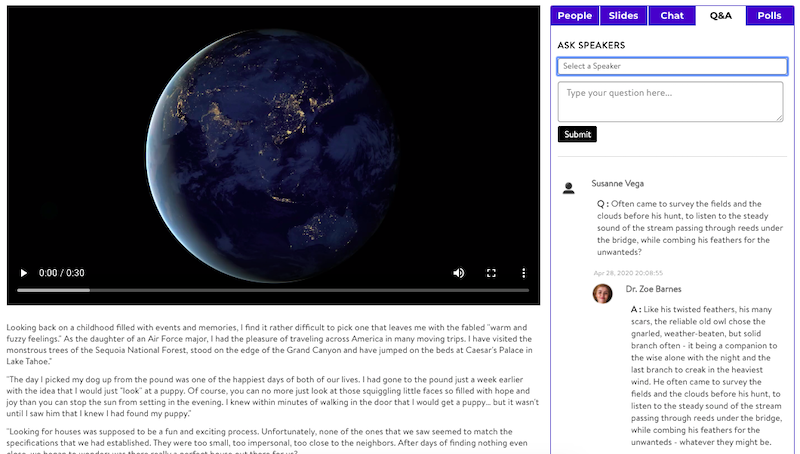
We have all, in some way or form, attended a virtual event. So, what is a virtual event? A virtual event is an event that takes place anywhere on the internet rather than in-person. It could be anything from a live stream session, live-tweeting, a Facebook watch Party, even your latest Snapchat post counts as a virtual event. These interesting new channels for hosting events may seem like they’ve only just surfaced, but in fact, virtual events have been around since 1993.
And now that you’re faced with your first virtual event, you may not know where to start from. So, we’ve put together a list of 10 fresh ways that will help you to organize your virtual event and ensure that it’s a roaring success. Let’s get to it!
#1 Research Your Audience
The very first step in organizing your inaugural virtual event is to get to know your audience. Why is this so important? Your audience is the ones that you are looking to appeal to, even market to. But, each segment of your target customers will have a specific preference when it comes to the type of virtual event they would be compelled to react to. A quick look at your social media data would give you the best insights as to which channel is the best way to reach out to your target audience.
#2 Decide Your Event Type
Now that you know how your audience listens, it’s time to pick ways to talk to them. In practice, very rarely would an event planner use only a single virtual event to speak to their target crowd. Instead, it would be a combination of two or more channels, to which their audience is most receptive to. A slice of your target audience pie may prefer live videos and frequent updates, while some may prefer written form, like live tweets or live Facebook updates. Tailor your event to their taste.
#3 Plan a Budget
As with any other event, virtual event planning needs to include a budget. There will be a few aspects that you will be spending on, like professional camera people, sound and emceeing. That is if you’re not planning on an impromptu live video shot with your trusty iPhone. Some prefer to enlist the help of social influencers to give their virtual events more traction, but that may also come with a hefty fee. Plan wisely and use only what you need for your event.
#4 Draw up Your Action Plan
With your selected platform and rough budget in place, you will need to plan out every detail of your virtual event. What is going to happen? Is it going to be a live sale? What will you be selling? Is it going to be a one-to-one sharing with your audience? If so, what is the topic going to be? Will you be taking questions from your audience? Are you planning on a giveaway? There are lots of things that you can do with a virtual event, the key is to define it clearly in order to have a successful online event.
#5 Get a Reliable Virtual Event Platform
When choosing a virtual platform, you should focus on the platforms which can stream live sessions at low-bandwidth and offer built-in engagement & networking tools for participants and exhibitors. Here’re some of the engagement features that you need; group chat, Q&A, live polling, with the ability to download slides and display speakers’ profiles. The networking features should include attendee matchmaking, 1-to-1 video/voice meetings, and private messaging. Such platforms, eg. Dryfta can make hosting a virtual event a breeze.
#6 Announce Your Event
As with any event, a good marketing strategy is necessary. Determine how you’d like to reach out to your audience and announce your event to them. For younger audiences, video-based social platforms would seem like a great way to start. For young adults and a much older age range on the spectrum, you may want to stick to the classic marketing tools like email and newsletters. Social platforms like Twitter and Facebook also seem to be a hit with the older crowd so those would be some feasible options as well. And when the date nears, use SMS notifications or even send your attendees a reminder on Facebook about your event.
#7 Hold Pre-Event Events
Having a few pre-event affairs would be a great way to hype your audience segments and keep their attention focused on the bigger event that is coming. Showing some behind the scenes preparations for your virtual event is a good way to start. Organizing mini-contests or sub-events in conjunction with your main event are also a good idea. The goal here is to maintain a hold on your audience’s attention and to keep reminding them of your upcoming event.
#8 Incorporate Giveaways
Everyone loves free stuff. Which is why giveaways have been a big deal of late. Figure out the kind of items or prizes that would be well received by your target audience. For a younger audience niche, items that involve technology and travel are commonly a big hit. Among older audiences, home appliances, domestic travel packages, and cash prizes work as better attention-grabbers.
#9 Don’t just host events. Build a community
When having your virtual event, always encourage your audience to participate and build a community buzzing with activities year-round. Some of the effective ways to have your viewers join in on the fun include getting them to leave a comment or reaction to your live stream, getting them to call in or even have them tweet actively with a specific hashtag. Get creative with this, and your audience will definitely remember what a great time they had at your virtual event.

#10 Crunch Them Data
Once everything is done, it’s time to analyze your data. For this, an event planning tool would be of great assistance to catch all your user traffic and behavior. Having a look at this data will tell you whether or not your event was a success. Aside from that, it also tells you what you should and should not do for your next virtual event when it comes to your particular audience segment.
Organizing a virtual event is not all that hard. Arm yourself with this 10-step guide on planning your next virtual event and a little bit of creativity, you will be on your way to becoming a virtual event expert. And in the light of this COVID-19 pandemic, the virtual event channel seems to be the only way to go about things. Best of luck!
Related Searches
- Role of a Virtual Event Manager
- Best Virtual Events Tips
- How To Handle Virtual Event Management Challenges?
- 10 Ways To Market Your Virtual Event Effective
- 10 Fresh Ideas to Engage Attendees at Your Virtual Event
- Virtual Team Building Activity
- Strategies for Organizing a Virtual Conference
- A Guide To Making Money with Virtual Events
- Top 7 Guides for Organizing a Successful Virtual Event
- 21 Gift Ideas for Virtual Events






